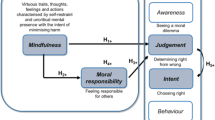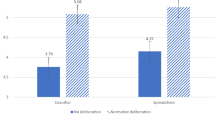Abstract
Many unethical decisions stem from a lack of awareness. In this article, we consider how mindfulness, an individual’s awareness of his or her present experience, impacts ethical decision making. In our first study, we demonstrate that compared to individuals low in mindfulness, individuals high in mindfulness report that they are more likely to act ethically, are more likely to value upholding ethical standards (self-importance of moral identity, SMI), and are more likely to use a principled approach to ethical decision making (formalism). In our second study, we test this relationship with a novel behavioral measure of unethical behavior: the carbonless anagram method (CAM). We find that of participants who cheated, compared to individuals low in mindfulness, individuals high in mindfulness cheated less. Taken together, our results demonstrate important connections between mindfulness and ethical decision making.
Similar content being viewed by others
References
Aquino, K. and A. Reed: 2002, ‘The Self-importance of Moral Identity’, Journal of Personality and Social Psychology 83(6), 1423-1440.
Arch, J. J. and M. G. Craske: 2006, ‘Mechanisms of Mindfulness: Emotion Regulation Following a Focused Breathing Induction’, Behaviour Research and Therapy 44 (12), 1849-1858.
Baer, R. A.: 2003, ‘Mindfulness Training as a Clinical Intervention: A Conceptual and Empirical Review’, Clinical Psychology: Science and Practice 10(2), 125-143.
Baer, R. A., G. T. Smith, J. Hopkins, J. Krietemeyer and L. Toney: (2006). ‘Using Self-Report Assessment Methods to Explore Facets of Mindfulness’, Assessment 13(1), 27–45.
Bandura A.: 1999, ‘Moral Disengagement in the Perpetration of Inhumanities’, Personality and Social Psychology Review 3(3), 193–209.
Bateson, M., D. Nettle, and G. Roberts: 2006, ‘Cues of Being Watched Enhance Cooperation in a Real World Setting’, Biology Letters 2(3), 412-414.
Bazerman, M., G. Loewenstein, and D. Moore: 2002, ‘Why Good Accountants Do Bad Audits’, Harvard Business Review 80(11), 96-103.
Bishop, S. R., M. Lau, S. Shapiro, L. Carlson, N. D. Anderson, J. Carmody, Z. V. Segal, S. Abbey, M. Speca, D. Velting and G. Devins: 2004, ‘Mindfulness: A Proposed Operational Definition’, Clinical Psychology: Science and Practice 11, 230–241.
Bodner, T. E. and E. J. Langer: 2001, ‘Individual Differences in Mindfulness: The Mindfulness/Mindlessness Scale’, Poster presented at the 13th Annual American Psychological Society Convention, Toronto, Ontario, Canada.
Brady, F. N. and G. E. Wheeler: 1996, ‘An Empirical Study of Ethical Predispositions’, Journal of Business Ethics 15(9), 927–940.
Brown, K. W. and R. M. Ryan: 2003, ‘The Benefits of Being Present: Mindfulness and Its Role in Psychological Well-Being’, Journal of Personality and Social Psychology 84(4), 822-48.
Brown, K. W., R. M. Ryan and J. D. Creswell: 2007, ‘Mindfulness: Theoretical Foundations and Evidence for its Salutary Effects’, Psychological Inquiry 18(4), 211-237.
Business Software Alliance: 2001, 2000 Global Software Piracy Report (Business Software Alliance, Washington, DC).
Carlson, L. E. and K. W. Brown: 2005, ‘Validation of the Mindful Attention Awareness Scale in a Cancer Population’, Journal of Psychosomatic Research 58, 29–33.
Chaiken, S. and Y. Trope (eds.): 1999, Dual Process Theories in Social Psychology, (Guilford Press, New York).
Chase, V. M., R. Hertwig and G. Gigerenzer: 1998, ‘Visions of Rationality’, Trends in Cognitive Science 2(6), 206–14.
Chugh, D., M. H. Bazerman and M. R. Banaji: 2005, ‘Bounded Ethicality as a Psychological Barrier to Recognizing Conflicts of Interest’, In D. A. Moore, D. M. Cain, G. Loewenstein, and M. H. Bazerman (eds.), Conflicts of Interest, (Cambridge University Press, Cambridge), pp. 74– 95.
Dana, J., R. A. Weber and X. Kuang: 2007, ‘Exploiting Moral Wiggle Room: Experiments Demonstrating an Illusory Preference for Fairness’, Economic Theory 33(1), 67–80.
DePaulo, B. and D. Kashy: 1998, ‘Everyday Lies in Close and Casual Relationships’, Journal of Personality and Social Psychology 74, 63–79.
Diener, E. and M. Wallbom: 1976, ‘Effects of Self-Awareness on Antinormative Behavior’, Journal of Research in Personality 10(1), 107–111.
Eifert, G. H. and M. Heffner: 2003, ‘The Effects of Acceptance Versus Control Contexts on Avoidance of Panic-Related Symptoms’, Journal of Behavior Therapy and Experimental Psychiatry 34(3-4), 293-312.
Epley, N. and E. Caruso: 2004, ‘Egocentric Ethics’, Social Justice Research 17(2), 171-187.
Garcia, S. M., J. M. Darley and R. J. Robinson: 2001, ‘Morally Questionable Tactics: Negotiations Between District Attorneys and Public Defenders’, Personality and Social Psychology Bulletin 27(6), 731-743.
Gino, F. and M. H. Bazerman: 2009, ‘When Misconduct Goes Unnoticed: The Acceptability of Gradual Erosion in Others’ Unethical Behavior’, Journal of Experimental Social Psychology 45(4), 708-719.
Goldenberg, D. L., K. H. Kaplan, M. G. Nadeau, C. Brodeur, S. Smith and C. H. Schmid: 1994, ‘A Controlled Study of a Stress-Reduction, Cognitive-Behavioral Treatment Program in Fibromyalgia’, Journal of Musculoskeletal Pain 2, 53-66.
Greene, J. D., S. A. Morelli, K. Lowenberg, L. E. Nystrom and J. D. Cohen: 2008, ‘Cognitive Load Selectively Interferes with Utilitarian Moral Judgment’, Cognition 107, 1144–1154.
Haidt, J.: 2001, ‘The Emotional Dog and Its Rational Tail: A Social Intuitionist Approach to Moral Judgment’, Psychological Review 108(4), 814–834.
Haley K. J. and D. M. T. Fessler: 2005, ‘Nobody’s Watching? Subtle Cues Affect Generosity in an Anonymous Economic Game’, Evolution and Human Behavior 26, 245-256.
Herman, T.: 2005, ‘Study Suggests Tax Cheating is on the Rise; Most Detailed Survey in 15 Years Finds $250 Billion-Plus Gap; Ramping Up Audits on Wealthy’, The Wall Street Journal March 30, D1.
Hunt, S. D. and S. Vitell: 1986, ‘A General Theory of Marketing Ethics’, Journal of Macromarketing 6(Spring), 5-16.
Jones, T. M.: 1991, ‘Ethical Decision Making by Individuals in Organizations: An Issue-Contingent Model’, Academy of Management Review 16(2), 366-395.
Kabat-Zinn, J.: 1990, Full Catastrophe Living: Using the Wisdom of Your Body and Mind to Face Stress, Pain, and Illness, (Delacorte, New York).
Kabat-Zinn, J.: 1994, Wherever You Go, There You Are: Mindfulness Meditation in Everyday Life, (Hyperion, New York).
Kabat-Zinn, J.: 2003, ‘Mindfulness-Based Interventions in Context: Past, Present, and Future’, Clinical Psychology: Science and Practice 10(2), 144-156.
Kabat-Zinn, J., L. Lipworth and R. Burney: 1985, ‘The Clinical Use of Mindfulness Meditation for the Self-Regulation of Chronic Pain’, Journal of Behavioral Medicine 8(2), 163-190.
Kabat-Zinn, J., M. D. Massion, J. Kristeller, L. G. Person, K. E. Fletcher, L. Pbert, W. R. Lenderking and S. F. Santorelli: 1992, ‘Effectiveness of a Meditation Based Stress Reduction Program in the Treatment of Anxiety Disorders’, American Journal of Psychiatry 149, 936–943.
Kabat-Zinn, J., E. Wheeler, T. Light, Z. Skillings, M. J. Scharf, T. G. Cropley, et al.: 1998, ‘Influence of a Mindfulness Mediation-Based Stress Reduction Intervention on Rates of Skin Clearing in Patients with Moderate to Severe Psoriasis Undergoing Phototherapy (UVB) and Photochemotherapy (PUVA)’, Psychosomatic Medicine 60, 625-632.
Kristeller, J. L. and C. B. Hallett: 1999, ‘An Exploratory Study of a Meditation-Based Intervention for Binge Eating Disorder’, Journal of Health Psychology 4(3), 357-363.
Lakey, C. E., W. K. Campbell, K. W. Brown and A. S. Goodie: 2007, ‘Dispositional Mindfulness as a Predictor of the Severity of Gambling Outcomes’, Personality and Individual Differences 43(7), 1698–1710.
Langer, E.: 1989, Mindfulness, (Addison-Wesley, Reading, MA).
Levitt, J. T., T. A. Brown, S. M. Orsillo and D. H. Barlow: 2004, ‘The Effects of Acceptance Versus Suppression of Emotion on Subjective and Psychophysiological Response to Carbon Dioxide Challenge in Patients with Panic Disorder’, Behavior Therapy 35(4), 747-766.
Liljenquist, K., C. B. Zhong and A. D. Galinsky: 2010, ‘The Smell of Virtue: Clean Scents Promote Reciprocity and Charity’, Psychological Science 21(3), 381–383.
Ma, S. H. and J. Teasdale: 2004, ‘Mindfulness-Based Cognitive Therapy for Depression: Replication and Exploration of Differential Relapse Prevention Effects’, Journal of Consulting and Clinical Psychology 72(1), 31–40.
Mackillop, J. and E. Anderson: 2007, ‘Further psychometric validation of the Mindful Attention Awareness Scale (MAAS)’, Journal of Psychopathology and Behavioral Assessment 29(4), 289–293.
Mazar, N., O. Amir and D. Ariely: 2008, ‘The Dishonesty of Honest People: A Theory of Self-Concept Maintenance’, Journal of Marketing Research 45(6), 633-644.
McCabe, D. L. and L. K. Treviño: 1997, ‘Individual and Contextual Influences on Academic Dishonesty: A Multicampus Investigation’, Research in Higher Education 38(3), 379–396.
Mead, N. L., R. F. Baumeister, F. Gino, M. E. Schweitzer and D. Ariely: 2009, ‘Too Tired to Tell the Truth: Self-Control Resource Depletion and Dishonesty’, Journal of Experimental Social Psychology 45(3), 594-597.
Miller, J. J., K. Fletcher and J. Kabat-Zinn: 1995, ‘Three-Year Follow-Up and Clinical Implications of a Mindfulness Meditation-Based Stress Reduction Intervention in the Treatment of Anxiety Disorders’, General Hospital Psychiatry 17(3), 192–200.
Moran, S. and M. E. Schweitzer: 2008, ‘When Better is Worse: Envy and the Use of Deception in Negotiations’, Negotiation and Conflict Management Research 1(1), 3–29.
Muraven, M. and R. F. Baumeister: 2000, ‘Self-Regulation and Depletion of Limited Resources: Does Self-Control Resemble a Muscle?’, Psychological Bulletin 126(2), 247–59.
Rest, J.: 1986, Moral Development: Advances in Research and Theory, (Praeger, New York).
Reynolds, S. J.: 2008, ‘Moral Attentiveness: Who Pays Attention to the Moral Aspects of Life?’, Journal of Applied Psychology 93(5), 1027-1041.
Reynolds, S. J. and T. L. Ceranic: 2007, ‘The Effects of Moral Judgment and Moral Identity on Moral Behavior: An Empirical Examination of the Moral Individual’, Journal of Applied Psychology 92(6), 1610-1624.
Robinson, R. J., R. J. Lewicki and E. M. Donahue: 2000, ‘Extending and Testing a Five Factor Model of Ethical and Unethical Bargaining Tactics: Introducing the SINS Scale’, Journal of Organizational Behavior, 21(6), 649-664.
Schweitzer, M. E. and C. K. Hsee: 2002, ‘Stretching the Truth: Elastic Justification and Motivated Communication of Uncertain Information’, Journal of Risk and Uncertainty 25(2), 185-201.
Schweitzer, M. E., L. Ordonez and B. Douma: 2004, ‘Goal Setting as a Motivator of Unethical Behavior’, Academy of Management Journal 47(3), 422-432.
Segal, Z. V., M. G. Williams and J. D. Teasdale: 2002, Mindfulness-Based Cognitive Therapy for Depression: A New Approach to Preventing Relapse, (Guilford Press, New York).
Shapiro, S. L., D. Oman, C. E. Thoresen, T. G. Plante and T. Flinders: 2008, ‘Cultivating Mindfulness: Effects on Well-Being’, Journal of Clinical Psychology 64(7), 840–862.
Tangney, J. P., R. F. Baumeister and A. L. Boone: 2004, ‘High Self-Control Predicts Good Adjustment, Less Pathology, Better Grades, and Interpersonal Success’, Journal of Personality 72(2), 271-322.
Tenbrunsel, A. E. and D. M. Messick: 1999, ‘Sanctioning Systems, Decision Frames, and Cooperation’, Administrative Science Quarterly 44(4), 684-707.
Tenbrunsel, A. E. and D. M. Messick: 2004, ‘Ethical Fading: The Role of Self Deception in Unethical Behavior’, Social Justice Research 17(2), 223-236.
Zhong, C. B., V. K. Bohns and F. Gino: 2010, ‘A Good Lamp is the Best Police: Darkness Increases Self- Interested Behavior and Dishonesty’, Psychological Science 21(3), 311–314
Author information
Authors and Affiliations
Corresponding author
Rights and permissions
About this article
Cite this article
Ruedy, N.E., Schweitzer, M.E. In the Moment: The Effect of Mindfulness on Ethical Decision Making. J Bus Ethics 95 (Suppl 1), 73–87 (2010). https://doi.org/10.1007/s10551-011-0796-y
Published:
Issue Date:
DOI: https://doi.org/10.1007/s10551-011-0796-y




